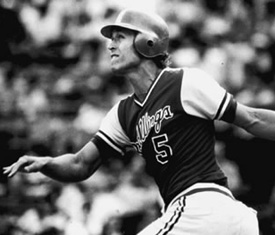Gwynn's quick ascent preludes storied career
Hall of Famer spent just 13 months in Minors before joining Padres
Tony Gwynn made his professional debut in June of 1981. Thirteen months later, he was in the Major Leagues.
With that sort of spectacular career trajectory, one would think that an article on the newly elected Hall of Famer's Minor League career would be as short and non-essential as a story detailing Cecil Fielder's stolen base exploits. One would be wrong.
While Gwynn's time in the San Diego farm system didn't last long, he certainly made an impression on those he played with, for and against. After all, he hit a spectacular .347 (246-for-708) with four teams over three levels of play. That sort of offensive output is bound to get people's attention, even when the player generating that level of production is as unassuming and humble as the esteemed Mr. Gwynn.
...
The Padres selected Gwynn in the third round of the 1981 First-Year Player Draft on the same day that the San Diego Clippers chose him in the 10th round of the NBA Draft. In what proved to be a fortuitous choice, Tony opted for a baseball career.
...
But before Gwynn could begin his career as an everyday corner outfielder in the big leagues, he had to ascend the rungs of the Padres' Minor League ladder. Walla Walla, Wash., was his first stop.
Walla Walla was home to the Padres' Class A Short-Season franchise, which competed in the Northwest League. Gwynn played in 42 games for the club in 1981 and put up spectacular numbers -- a .331 average, .411 on-base percentage and .612 slugging percentage.
Here is a Gwynn story that I've never heard and it is related by former teammate Greg Booker.
"Tony could flat out run, too. He had two or three inside-the-park home runs in Walla Walla, but I remember one of them was called back after the umpire said he missed first base. That was in Eugene, Oregon. Tony was so mad that he threw his tobacco at the umpire and got ejected. That was the only time I ever saw him try to get thrown out of a game."
Gwynn's Double-A stop was the Amarillo Gold Sox of the Texas League. While the jump from Class A to Double-A is usually considered one of the most difficult for a Minor League ballplayer to make, Gwynn handled his new surroundings with ease. He arrived in Amarillo in August and hit a gaudy .462 (42-for-91) over the final month of the 1981 season.
Gwynn opened up the 1982 campaign with the Triple-A Hawaii Islanders of the Pacific Coast League, and he picked up right where he left off. Over 93 games in Hawaii, he hit .328 while striking out just 18 times over 366 at-bats.
Walla Walla to Amarillo to Hawaii to San Diego to Cooperstown.
Now for Ripken
Ripken wasn't always an icon
Newly minted Hall of Famer could have been a pitcher
Now a look at Ripken the prankster:Thanks in large part to playing in a record 2,632 consecutive games, Ripken became known as our nation's "Iron Man," a stoic, durable workhorse whose on-field accomplishments transcended baseball and became the stuff of legend. With this image of Ripken so firmly embedded in the popular imagination, it's a bit difficult to imagine him as an untested, error-prone, mischievous teenager.
Yet that's exactly what he was when he began his professional career in 1978 at the age of 17. Ripken was selected with the 48th pick of the draft by the Baltimore Orioles, the organization that also employed his father, Cal Sr., for 36 years.
Although Ripken, a Maryland native, was an offensive standout in high school, most of the teams who had scouted him felt his true potential was on the mound. After all, he had gone 7-0 with 100 strikeouts over 60 innings in his senior season.
In a decision that ultimately had a great impact on baseball history, Cal decided he wanted to play the infield rather than pitch, largely because it would give him a chance to play every day. After signing with Baltimore, Ripken was assigned to the Rookie-level Bluefield Orioles. In 63 games as the club's starting third baseman, he hit .264 and drove in 24 runs, none of which came via the long ball.
That's right, the man who redefined shortstop as a power position after slugging more than 400 Major League home runs failed to go yard in his first professional season.
Ripken spent most of the 1979 season with Class A Miami, where his numbers improved. In 105 games, the 18-year-old hit .303 with five homers and 54 RBIs. He ended the season with Double-A Charlotte, but not before finding a way to make [teammate John] Shelby very, very angry one day in Miami Beach.
"We were having a team party, and Cal and a few of the guys were trying to teach me how to body surf," recalled Shelby. "At the time, I had a pair of Converse sneakers, which I treasured. They were my favorite pair of shoes in the whole world. So I left my Converse on the beach while I tried to body surf, and when I got out of the water Cal told me he'd thrown one of my shoes in the ocean. I ran into the water to get it, and when I came back out Cal told me he'd thrown the other shoe in. I never did find that one."I was so mad at Cal, but next thing you know, I started getting free cleats. They were from Cal, and he ended up buying my cleats for years and years after that. That never quite compensated for my Converse, though."
Now a picture of Ripken with the Rochester Red Wings from milb.com and the Red Wings:

No comments:
Post a Comment